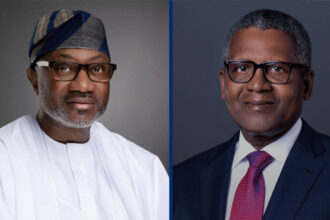Democracy they say flourished in an enlightened society. It is also said to flourish where society evolves from ethno-religious thinking into nationhood.
In Nigeria, these typical characteristics of democratic governance is virtually absent in our fledging but nascent democracy. However, our Constitution subtly provides for equal participation of all ethnic groups in the various States and the Federation.
ATTENTION: Click “HERE” to join our WhatsApp group and receive News updates directly on your WhatsApp!
Democratic sages in subtle enforcement of the provisions of the Constitution concerning equal participation of government, struck a deal christened: “Gentleman Agreement”, which states that power should rotate between North and South of the Federation and in the State, between the Senatorial Districts or among the various ethnic groups as the case may be.
The faithful application of this democratized agreement has been a problem to power brokers in the various States. This quagmire has always been a problem to the people of Delta State as one ethnic group do breach the agreement in every election year.
At the inception of the present democratic dispensation, two persons contested the gubernatorial election on the platform of People’s Democratic Party (PDP). They’re: Chief Felix Ibru (late) and Chief James Onanefe Ibori. The duo are all from the Urhobo ethnic group. Every other ethnic groups jettisoned their governorship ambitions to rally round these persons. At the end, Chief Ibori won the elections.
In 2003, knowing fully well that the Urhobos must complete their constitutional two terms in the government of Delta State, all other ethnic groups again, rest their oars to allow only Urhobo people to contest the election. Hence, Great Ovedje Ogboru contested on the platform of Action for Democracy (AD) against Ibori who again contested on the platform of PDP and won the election.
In 2007 when Ibori left office, the thinking of many Deltans, especially the non-Urhobo tribes was that the various political parties must feature only other tribes to contest the guber election since Urhobo people have completed their own. Alas, the Urhobo had more contestants for the governorship race than even all contestants from the other ethnic groups put together.
The likes of Sen. Pius Akpo Ewerido (late), Ejaife Odebala, Oscar Ibru, Albert Okumagba amongst other Urhobo sons contested against Sen. Ifeanyi Okowa (representing Ika ethnic group) and Dr. Emmanuel Eweta Uduaghan (representing Itsekiri ethnic group). Emmanuel Eweta Uduaghan won the PDP primary and had to contest the real election against Great Ovedje Ogboru from Urhobo who contested on the platform of Democratic Peoples Party (DPP).
In Uduaghan’s second term, Chief Great Ogboru contested against him on the platform of DPP and lost. Uduaghan’s two terms were supposed to be the exclusive right of Delta South Senatorial District to contest as it was in the case of Ibori but the Urhobos breached the zoning agreement.
Similarly in 2015 after Uduaghan completed his statutory two terms, Deltans again agreed in principle to cede power to the Delta North Senatorial District since the Central and the South have gotten theirs. The Urhobos came calling again and contested against the Delta North aspirants. The likes of David Edevbie threw their caps in the ring under the platform of PDP. Surprisingly, Gov. Okowa won the primary election. He had to contend with Great Ovedje Ogboru who contested under the platform of Labour Party (LP).
In 2019, again Ogboru contested against Okowa under the platform of All Progressive Congress (APC). The question now kissing our lips is whether there has been a zoning arrangement in the State? If there was any, has it been faithfully adhered to? Lastly, if there is any breach of of the gentleman agreement then who breached it? I think analysts can answer the above questions gleaned from the information above.
Now that it has become obvious that one ethnic group has been serially breaching the gentleman agreement, can 2023 election be the exclusive right of the Urhobo ethnic group? The answer to us, is capital NO. Is it justifiable for other ethnic groups to contest the 2023 gubernatorial election in the Delta State? The answer to us is YES.
Another question we must ask is whether it is justifiable for the Ijaw ethnic group to demand for the governorship position of Delta State. The answer is capital YES. Delta State is a multi ethnic State which is made up of Anioma, Ika, Ijaw, Isoko, Itsekiri, Ndokwa and the Urhobos. The Ijaws are the second largest ethnic group after the Urhobos. Their lands produced the highest crude oil deposits which has been fetching the State so much revenues.
In a similar vein, the Delta South Senatorial District always give the State since 1999 the highest votes to secure victory for the PDP. The survival of PDP in any elections in Delta State lies in the block votes the Ijaws and their neighbours in the South produced for the Party. Tell us why shouldn’t the Ijaw man contest the governorship office?
It is better and for the continues survival of the PDP in the State that the Ijaw people be given the opportunity to rule the State. With this suggestion considered favourably we are sure of a stronger PDP. In the absence of the suggestion herein, the Ijaws may feel real political marginalization that has continued unabated and that may trigger a search for a befitting political platform that may address her plight.
Signed : For Delta Ijaw Advocacy Group (DIAG)
Amb. Okporu Augustine JP

